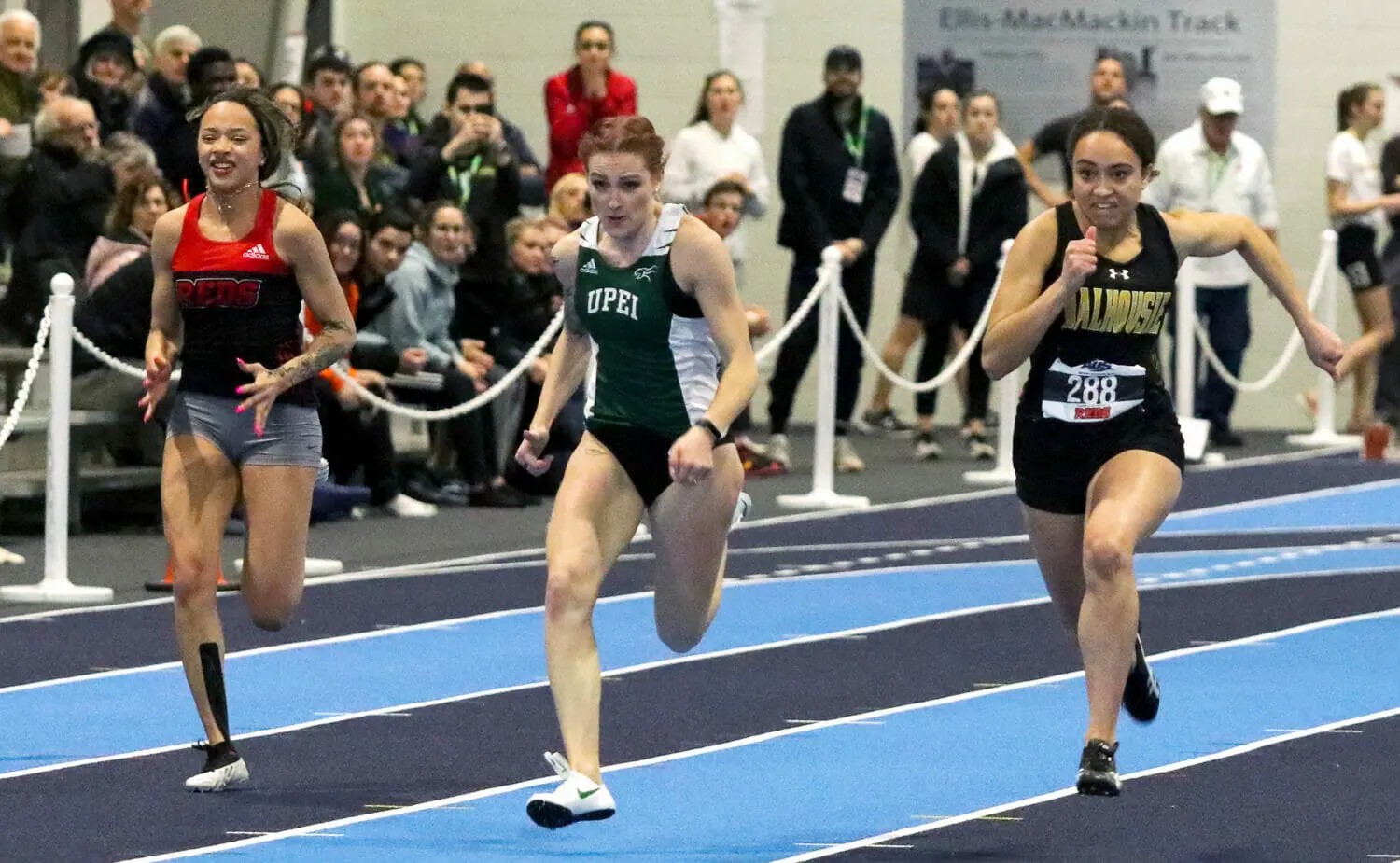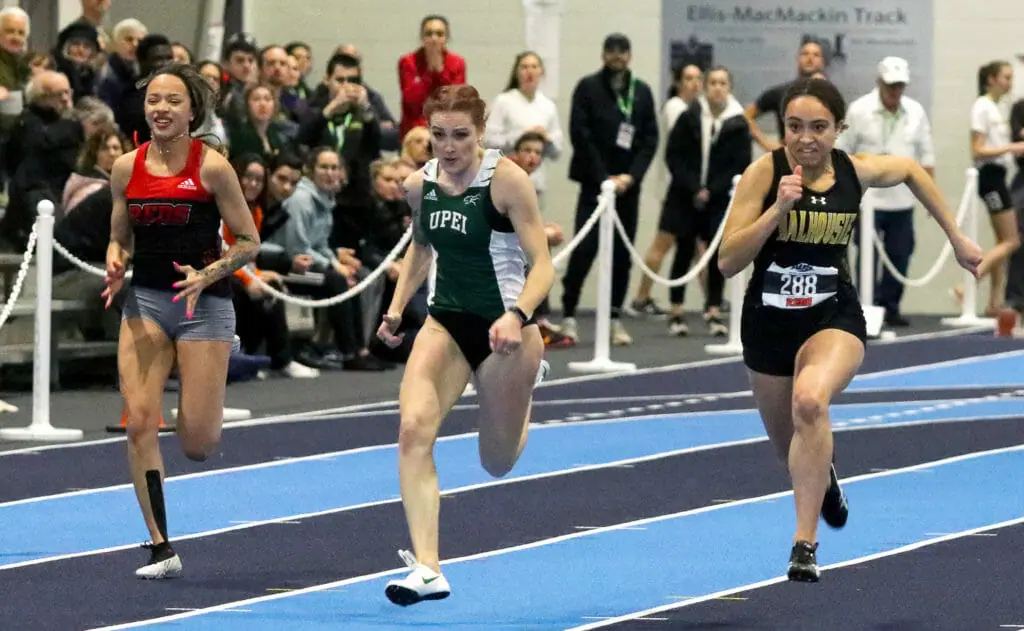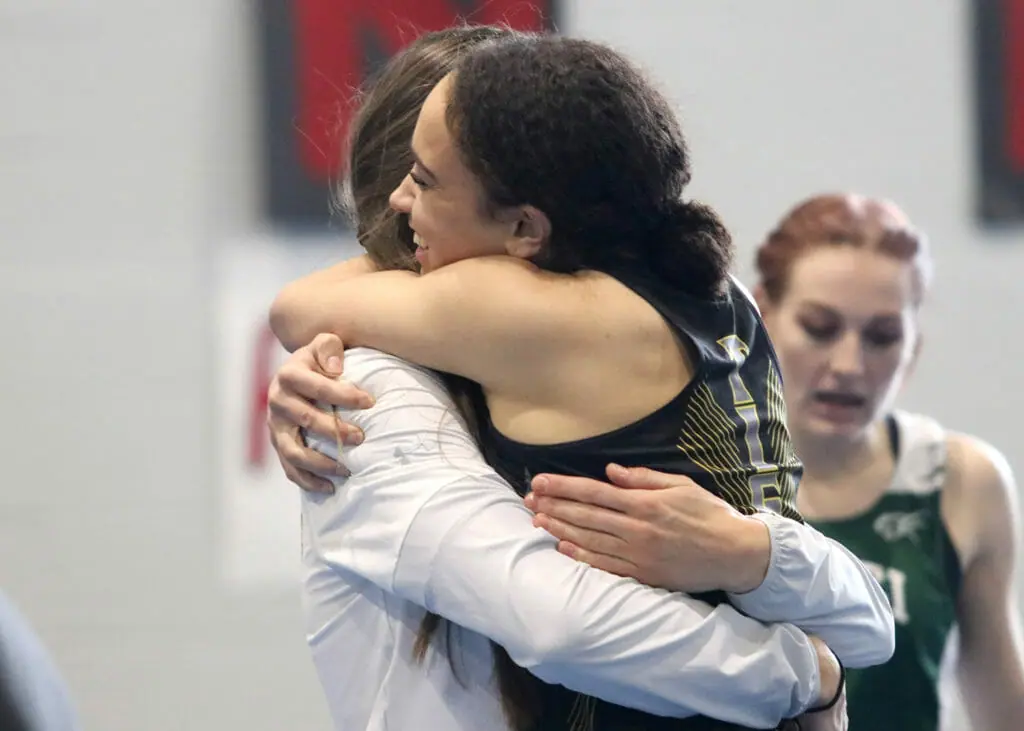Last spring, sprinter Maya Reynolds took home a bronze medal in the 60 metre race at the U Sports Track and Field Championships.
“It was really surreal because you look forward to that moment for a while and then it just it kind of all comes together,” says Reynolds about a year later.
Her time of 7.50 seconds shattered her previous personal best, after a season of running the same race without improvement.
“It was just kind of an average season leading up until that point,” says sprints coach Mike Bawol, “but what I saw from her in training indicated that she was capable of much more, she just wasn’t achieving it in competition.”
“I think I had run the same time the entire year which was super frustrating and so then when I got to nationals it was like, ‘well, it better happen here,'” Reynolds laughs.
She went into nationals having ran to a second place finish in the Atlantic University Sport (AUS) championships with a time of 7.64.
Then at nationals, she ran a personal best in the preliminary heats for the 60 metre.
“When that happened and I still felt I could go a tiny bit faster,” she said, “I knew that I was ready for a breakthrough.”
Coming off of that season, the fourth-year runner didn’t get the start she wanted this year. She was running some of her slowest times in her university career in practices in November and December.
“That was very humbling to be running pretty slow, but it’s all sorted out now,” Reynolds says.
She’s figured her way around those setbacks and is seeing the results, with first place Atlantic University Sport (AUS) finishes in the 60 metre and 300 metre races.
New challenges
“It’s funny because you feel like you have it figured out,” says Bawol. “You’re like, ‘OK, we’ve got the recipe’ and then you find new challenges. It’s another year.”
Last season, when Reynolds almost slept through a meet in February, they figured out that although training was going well, something else was off.
“Sleep’s really important,” says Bawol. “You need to sleep. You need to invest in this recovery.”
That was about three weeks before the U Sports championships. As they put more of a focus on recovery, “you could see a big shift in training,” he says.
“It translated at the perfect time for having a huge breakthrough performance at U Sports championships.”
This season, something similar happened. Reynolds slipped on recovery because of schoolwork and part-time work, and training wasn’t going as well. But they got on top of it much sooner and figured out the issue.
One change was that Bawol spaced out Reynolds’ training to give her more recovery. For example, she would have really intense practices for two days, followed by five days of really light workouts.
Reynolds gives a lot of credit to Bawol and how he treats each of his athletes as individuals with different training needs.
“I think he’s the best coach to allow you to perform at your peak,” she says. “I’m so thankful for the time he puts in for our team. I honestly would not be where I was without him.”
The change in training worked: “She started to run much faster times earlier in the season,” says Bawol.
That included a 7.54 result in the 60 metre race at the NB Indoor University Invitational, a time that auto-qualified her for a spot at the U Sports championship.
At the AUS championships at the end of February, Reynolds broke the AUS record in the 60 metre race, with a time of 7.56 seconds. Not a personal best, it was nonetheless a strong race because of a more difficult set up: the day before, she raced the 300 metre and a leg of the 4×200 metre relay, and was fighting a cold.
“I think I was more fatigued than I thought I was, so I was just happy I did decently well and didn’t fall apart in the race,” she says.
It’ll be a different story at the U Sports championships this year. Reynolds is competing in both the 60 metre and 300 metre races, but the 60 metre is first.
“She can run it 100 per cent fresh, so I’m really excited to see what she can do there,” says Bawol.
Improving field
This year, the level of competition is much stronger in the 60 metre race, says Bawol. You can see this in Reynolds’ national ranking. Last year, heading into U Sports, she was ranked ninth. This year, with a faster time, she’s only up to eighth.
“You can have a super strong year but the competition gets that much stronger,” says Bawol. “It just makes it still very competitive at the [nationals].”
“It depends so much on what other people are doing,” says Reynolds. “I just try to focus on running my fastest in the year.”




Recent Comments